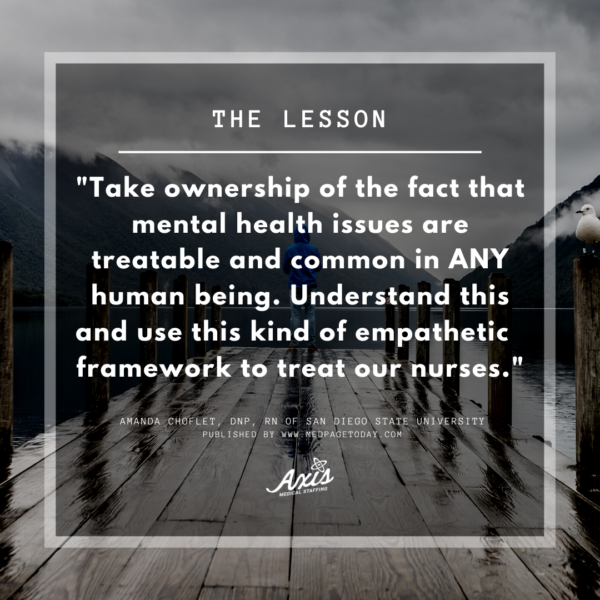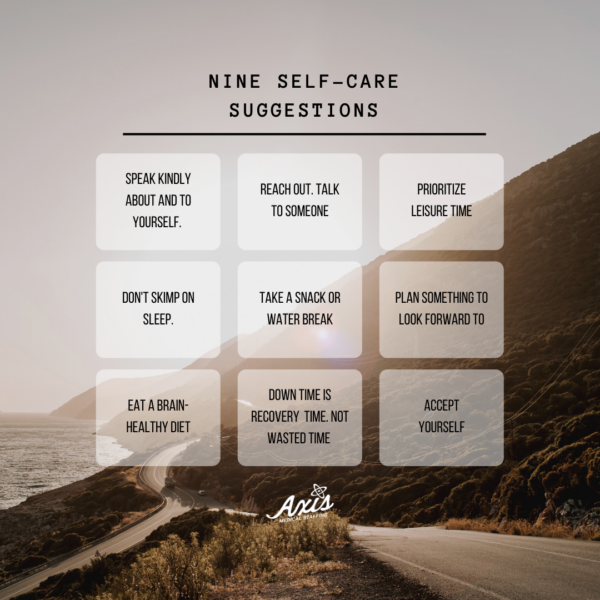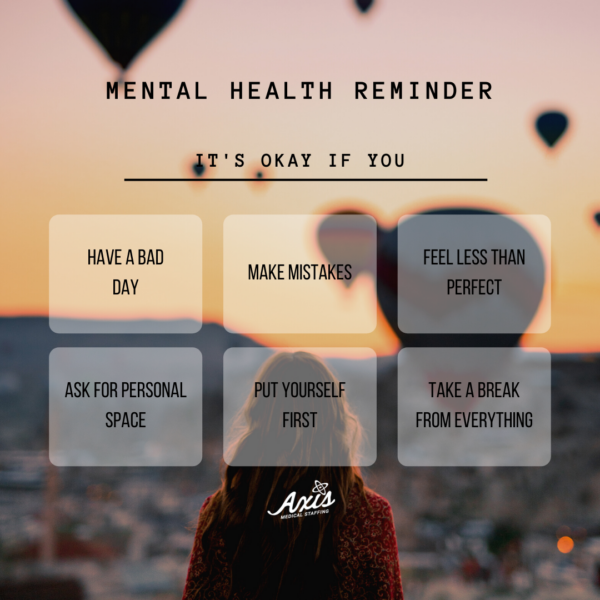May is Mental Health Awareness Month. According to the National Institute of Mental Health, nearly 1 in 5 U.S. adults live with a mental illness, and the COVID-19 pandemic has only exacerbated the situation. Job loss, loneliness during lockdowns, and uncertainty about the future led to an unprecedented number of Americans experiencing symptoms of anxiety and depression. The percentage of people suffering from anxiety jumped from 6% in 2019, to 36% at the beginning of 2021, and people suffering from depression increased from 7% to 28%, according to the U.S. Census Bureau. Nurses were especially vulnerable to mental health problems during the pandemic dealing with burnout, unsafe working conditions, and death on a daily basis.
However, mental health issues are nothing new in the nursing profession. According to data from the CDC compiled from 2003 to 2019, nurses were significantly more likely to report symptoms of depression (82%) prior to death by suicide. They were also significantly more likely to have job problems like job loss and unemployment, and female nurses were more likely to have physical health problems reported prior to death than their male counterparts.

Nurses Often Struggle in Silence
Mental health problems for nurses are also compounded by the stigma that surrounds nurses who speak out about their struggles. There is a culture of perfectionism, competition, and bullying in healthcare settings that often leads to nurses burying their feelings and not seeking the help they need. Furthermore, nurses may adopt unhealthy coping mechanisms like alcohol or drug abuse as a way to cope with these intense stresses. Travel nurses in particular can be especially vulnerable to mental health issues due to the challenges of moving from one hospital to the next, having to adapt to new work environments quickly, and being away from friends and family for long periods of time.
With all that in mind, it’s imperative that nurses feel empowered to talk about their mental health and are provided access to the resources they need to improve their mental well-being. If you are struggling with your mental health, remember you are not alone. Here are a few tips and resources to help you take control of your mental health!

Practice Self-Care
Whether it’s taking a walk, having a spa day, or practicing mindfulness, having a self-care routine is key to combatting feelings of anxiety and hopelessness. We all have different ways to relax and cheer ourselves up, so find out what works best for you. Self-care also means prioritizing your own health, and not just the health of your patients. Eating well, getting plenty of sleep, and exercising regularly can help you feel more energized and improve your mental outlook. Moreover, don’t be afraid to schedule some “me” time. If you know you have a few days off coming up, plan an activity or an outing that you know you’ll enjoy so you’ll have something to look forward to when you’re feeling down.

Focus on Creating Positive Relationships
You can’t always control what happens to you, but you can control who you spend your time with and include in your social circle. Focus on surrounding yourself with people who care about your well-being and want to see you succeed. If you have a co-worker you like and trust, it’s always nice to vent to someone who knows what you’re going through. Keep in contact with your friends and family when you’re on assignment, and try FaceTiming or Skyping your friends and family instead of just calling or texting. Making new friends can be a challenge, but getting involved in a group activity you enjoy is a great way to meet other like-minded people.
Take Advantage of Available Support Structures
Some healthcare facilities may have counseling or chaplain services available, but if not, there are other alternatives. Therapy is something that should be normalized and not stigmatized, so find a therapist in your area that you can trust. Even if it’s just to chat about your day, having that safe space to talk and unwind can make all the difference. Online counseling services like Talkspace and Better Help can also be useful resources and are available 24/7 if you have an urgent need.

Learn to Forgive Yourself
We’re all human and nobody’s perfect. Mistakes are a part of life, and it’s crucial that you learn to forgive yourself when you screw up. As a nurse, it’s especially difficult, because an error could mean the difference between life and death. If you slip up, don’t let it send you into a spiral. Focus on learning and growing from your mistakes so you can become a better nurse. Remember, you chose this profession for a reason, and you are a Rock Star! Believe in yourself and good things will follow!
If you or someone you know is struggling with depression or suicidal thoughts dial 988 to reach the National Suicide Prevention Lifeline
Want to feel valued and appreciated? Apply today!
"*" indicates required fields
- Five Reasons to Visit Washington State - October 11, 2023
- Travel Nursing Assignments – Seattle: Live Like A Local - October 11, 2023
- Traveler of the Month: Ciene G! - January 27, 2023

